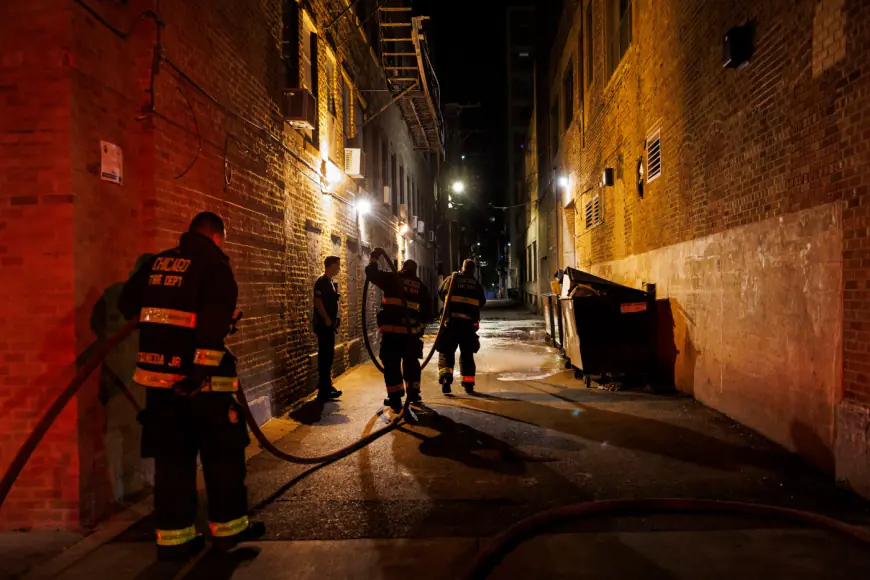Aldermen focus on Chicago Fire Department union contract, aging fleet in 2025 budget hearing
The $760.8 million budget Mayor Brandon Johnson proposed for the Fire Department in 2025 is down 2% from this year.

Aldermen fretted about the Chicago Fire Department’s aging vehicle fleet and sure-to-be-expensive union contract Tuesday as the city’s budget hearings continued.
The $760.8 million budget Mayor Brandon Johnson proposed for the department for 2025 is down 2% from this year. That total does not include the long overdue deal with raises and back pay that could be struck soon with Chicago Firefighters Union Local 2, though money is allotted for the possible contract elsewhere in Johnson’s spending plan.
Department leaders were mum on what a final deal with the frustrated union might look like, but said an agreement was getting closer.
“We are continuing to meet on a regular basis with Local 2, and there is incremental progress being made,” the CFD’s general counsel, Evan Haim, said.
Johnson’s proposed budget includes enough money to give firefighters 5% raises, in line with a deal struck last October for rank-and-file police officers, city budget leaders have told the Tribune. The contract is expected to include back pay for three years’ worth of raises since 2022.
“It’s distressing because we know that there’s a retroactive balloon payment that is going to come with that, and that is going to be a bite,” Ald. Daniel La Spata, 1st, told CFD Commissioner Annette Nance-Holt.
Local 2 President Pat Cleary told the Tribune Tuesday he expects a deal with “modest pay raises” to come in the next year. He wants the City Council to put in more money to buy new vehicles for the department.
“We need more manpower, we need more ambulances, we need more apparatus,” Cleary said.
Nance-Holt pointed to the aging fleet of ladder trucks, engines and ambulances as another challenge for the department. She blamed “years of disinvestment” for the problem.
“This can has been kicked down the road a long time. The Fire Department has always been the last at the table,” Nance-Holt said.
In the Fire Department’s fleet, 63% of the engines, 33% of the trucks and 20% of the tower ladders have been in use longer than their 15-year recommended lifespan, according to a department spokesperson.
Grants to replace fire department vehicles across the country have become more competitive as prices for the vehicles themselves have jumped in recent years, Nance-Holt said. A new fire engine costs nearly $1 million, she said.
Money for new CFD vehicles is budgeted within the city’s Department of Fleet and Facility Management. Nance-Holt asked aldermen to make the case with that department’s commissioner.
“I believe we might be putting firefighters at risk with some of the older equipment we have,” Ald. Lamont Robinson, 4th, said.
Ald. Pat Dowell, 3rd, floated the possibility of using tax increment finance money to cover the cost of paying for new vehicles for the department. Nance-Holt added that she is working with U.S. Rep. Mike Quigley, D-Chicago, to secure federal funding to buy another truck.
Other congressmen representing Chicago should push for more money in Washington, D.C., Ald. Bennett Lawson, 44th, said.
“We know we’re going to get less out of the federal government,” he said.
Aldermen also asked how the department was increasing diversity in its ranks and making sure injured firefighters recover to keep working.
Asked by Dowell about how many CFD workers are off on medical “layup,” Nance-Holt identified the current process for the department’s paramedics, EMTs and firefighters to return to work as another challenge.
Over 250 CFD workers are currently on leave, she said. Each of them — in addition to the over 900 Chicago Police Department staffers on medical leave — are seen by just one doctor. That allows some of the people on medical leave to reschedule appointments and fall through the cracks.
Nance-Holt said her goal is to “eliminate abuse of the system.”
“You’ll be able to get a lot of people back to work,” she said. “They definitely need more than one doctor between two large departments … it’s not adequate enough to serve.”
Chicago Tribune’s Alice Yin contributed.
What's Your Reaction?









































































































